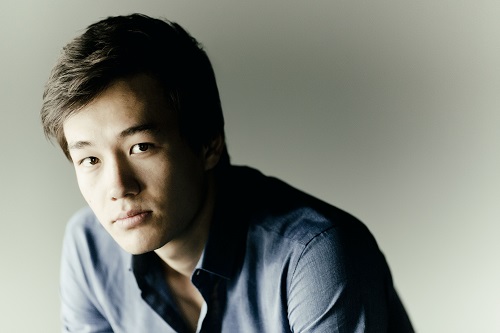 United Kingdom Sibelius, Mozart, Wagner: Louis Schwizgebel (piano), City of Birmingham Symphony Orchestra / Vassily Sinaisky (conductor). St David’s Hall, Cardiff, 23.10.2018. (PCG)
United Kingdom Sibelius, Mozart, Wagner: Louis Schwizgebel (piano), City of Birmingham Symphony Orchestra / Vassily Sinaisky (conductor). St David’s Hall, Cardiff, 23.10.2018. (PCG)

Wagner – Der fliegende Holländer, Overture
Mozart – Piano Concerto No.21 in C K467
Sibelius – Symphony No.1 in E minor Op.39
Last year I noted with approval the increased attendances at the Cardiff St David’s Hall series of International Concerts, and with extreme pleasure the large numbers of the younger generation who formed part of that audience. At the first concert of the new season last week I observed with concern the smaller number of listeners, and at this second concert of the International series I was horrified to see huge swathes of empty seats in the stalls, with whole rows untenanted. I find myself at a loss to explain this sudden exodus. It cannot have been over-familiarity with the programme; none of the works featured here had been heard in Cardiff for four years or so. It cannot have been lack of popular appeal; audiences for Sibelius and Wagner in this venue have always been substantial. It cannot have been competition from other events; nothing of substance was scheduled elsewhere in the city, and there was no consequent traffic congestion. All that can be said is that those who absented themselves – for whatever reason – missed a real treat.
The concert opened with a properly stirring account of Wagner’s overture to The Flying Dutchman. The strings excitingly portrayed the surge of the sea and the horns rang out with their depiction of the doomed ship and its captain. The orchestral playing was superbly alert and well balanced throughout, and Vassily Sinaisky delivered an energetic reading. It was also distinguished by the plangent cor anglais of Rachel Pankhurst in her rendition of Senta’s theme.
The overture was followed by a superbly judged performance of Mozart’s Piano Concerto No.21¸ with the central ‘Elvira Madigan’ slow movement as a withdrawn episode between the sparkling outer movements. with Louis Schwizgebel’s heartfelt and delicate playing. Mozart left no written-out cadenzas for the first and last movements; Schwizgebel excelled in some delightfully cheeky playing but reprehensibly the programme gave us no indication who was responsible for the music at those points. Likewise, the soloist give no announcement of the music he furnished as an encore. Maybe he felt that the audience needed no introduction to the well-known work he was about to play. Still, there were inevitably listeners unfamiliar with the music, and the failure to provide even the name of the piece and its composer may not have encouraged them to return in future to an event from which they may have felt excluded. Suffice it to say that Schwizgebel’s performance of Chopin’s ‘Raindrop’ Prelude was perhaps over-smooth, missing the element of melancholic despair which can be felt in other performances – not that those deprived of information about the music will have been in a position to notice.
Sibelius symphonies in Cardiff have in recent years become mainly familiar through the advocacy of Thomas Søndergård, the former principal conductor of the BBC National Orchestra of Wales, who has not only given some superlative performances in live concerts but has also embarked on a series of studio recordings on CD. Vassily Sinaisky has an equally formidable reputation in Sibelius, stretching back many years. I have long cherished what I regard as his magnificent 1993 complete recording of the symphonic poems with the Moscow Philharmonic Orchestra (it received rather scant attention from reviewers at the time of issue, possibly because of the incredibly ugly artwork on the cover, although this has been immeasurably improved in the Brilliant Classics reissue: reviews of the CDs in Fanfare magazine were diametrically and almost comically opposed in their views of their merits or otherwise, describing the set variously as ‘great sound, great performances’ and ‘a turkey’). It was interesting to watch his approach to Sibelius. He set appropriate speeds – not always easy in view of the composer’s sometimes alarmingly vague instructions – and maintained them with granitic control, allowing at the same time plenty of scope for the orchestral players to make their own mark on the music. The results were an interesting contrast to Søndergård’s more interventionist approach, but no less exciting and certainly no less imposing. Sinaisky allowed the clarinettist Oliver Janes to set his own speed in the unaccompanied opening passage, for example, but then assumed control as the orchestra entered in a purely seamless fashion, and the music was never allowed to stagnate. The scherzo was a bubbling cauldron of sound, and the finale had all the broad expanse in the peroration that one could wish with positive echoes of Tchaikovsky in its grand sweep. The gale force of the winds which blow through the opening movement were no less impressive here than in the Wagner overture.
The audience were enthusiastic in their applause at the end, and rightly so. It is always a pleasure to hear the City of Birmingham Symphony Orchestra, and they were in cracking form. One hopes that their next appearance in Cardiff will be better attended. In the meantime the orchestra and conductor, with Benjamin Grosvenor as soloist, are repeating the same programme on 25 October in Birmingham and 26 October in Stoke; audiences there will be well served.
Paul Corfield Godfrey
I agree – this was an enjoyable concert. Regarding the poor attendance, many adventurous music lovers presumably went to Music Theatre Wales’ performance of Pascal Dusapin’s opera ‘Passion’ on the same evening.